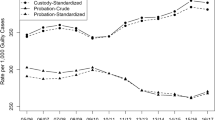Abstract
When an offender is sentenced in the criminal courts of England and Wales, the primary factor that determines the severity of the sentence is the seriousness of the offence. This principle has been firmly established in statute by the Criminal Justice Act 2003. In section 143(1) of this act, courts are instructed to determine the seriousness of an offence by considering the offender’s culpability in committing the offence and any harm which the offence caused, was intended to cause, or might fore-seeably have caused. The principle that the seriousness of the offence should be the primary basis for the severity of the sentence is further reinforced by the Sentencing Council for England and Wales, an independent, nondepartmental body of the Ministry of Justice, established by the Coroners and Justice Act 2009. The Council puts this principle into practice in a number of ways, one of which is the provision of offence-specific sentencing guidelines that operationalise the concept of offence seriousness, (see Ashworth and Roberts, 2013 for discussion of the format of sentencing guidelines.)
Access this chapter
Tax calculation will be finalised at checkout
Purchases are for personal use only
Preview
Unable to display preview. Download preview PDF.
Similar content being viewed by others
References
Ashworth, A. (2010) Sentencing and Criminal Justice. 5 th ed. Cambridge: Cambridge University Press.
Ashworth, A. and Roberts, J.V. (2013) The origins and nature of the sentencing guidelines in England and Wales. In: A. Ashworth and J.V. Roberts (eds) Sentencing Guidelines: Exploring the English Model. Oxford: Oxford University Press.
Cooper, J. (2013) Nothing personal: the impact of personal mitigation at sentencing since creation of the council. In: A. Ashworth and J.V. Roberts (eds) Sentencing Guidelines: Exploring the English Model. Oxford: Oxford University Press.
Dingwall, G. and Koffman, L. (2008) Determining the Impact of Intoxication in a Desert-Based Sentencing Framework. Criminology and Criminal Justice, 8: 335–348.
Dolinko, D. (2000) Justice in the Age of Sentencing Guidelines. Ethics, 110: 563–585.
Garson, D.G. (2014) Ordinal Regression (Statistical Associates ‘Blue Book’ Series). Asheboro: Statistical Associates Publishing. Kindle edition.
Gorard, S. (2013) Research Design: Robust Approaches for the Social Sciences. London: Sage.
Jacobson, J. and Hough, M. (2007) Mitigation: The Role of Personal Factors in Sentencing. London: Prison Reform Trust.
Kazemian, L. (2010) Assessing the impact of a recidivist sentencing premium on crime and recidivism rates. In: J.V. Roberts and A. von Hirsch (eds) The Role of Previous Convictions at Sentencing: Theoretical and Applied Perspectives. Oxford: Hart Publishing.
Lee, J. (2010) Repeat offenders and the question of desert. In: J.V. Roberts and A. von Hirsch (eds) The Role of Previous Convictions at Sentencing: Theoretical and Applied Perspectives. Oxford: Hart Publishing.
Mair, G. (2011) The Community Order in England and Wales: Policy and Practice. Probation Journal, 58: 215–232.
Maslen, H. and Roberts, J.V. (2013) Remorse and sentencing: an analysis of sentencing guidelines and sentencing practice. In: A. Ashworth and J.V. Roberts (eds) Sentencing Guidelines: Exploring theEnglish Model. Oxford: Oxford University Press.
Padfield, N. (2011) Intoxication as a sentencing factor: mitigation or aggravation? In: J.V. Roberts (ed.) Mitigation and Aggravation at Sentencing. Cambridge: Cambridge University Press.
Pina-Sanchez, J. and Linacre, R. (2013) Sentence Consistency in England and Wales. British journal of Criminology, 53: 1118–1138.
Rex, S. and von Hirsch, A. (1998) Community Orders and the Assessment of Punishment Severity. Federal Sentencing Reporter, 10: 278–282.
Roberts, J.V. (2008) Punishing Persistence. British journal of Criminology, 48: 468–481.
Roberts, J.V. (2011) Sentencing Guidelines and Judicial Discretion. British journal of Criminology, 51: 997–1013.
Roberts, J.V. (2013) Punishing, more or less: exploring aggravation and mitigation at sentencing. In: J.V. Roberts (ed.) Mitigation and Aggravation at Sentencing. Cambridge: Cambridge University Press.
Roberts, J.V. and von Hirsch, A. (2010) Previous Convictions at Sentencing: Theoretical and Applied Perspectives. Oxford: Hart Publishing.
Sentencing Council (2011a) Burglary Offences: Definitive Guideline. London: Sentencing Council.
Sentencing Council (2011b) Assault Guideline: Response to Consultation. London: Sentencing Council.
Tudor, S. (2008) Why Should Remorse be a Mitigating Factor in Sentencing? Criminal Law and Philosophy, 2: 241–257.
Walker, N. (1999) Aggravation, Mitigation and Mercy in English Criminal justice. London: Blackstone.
Young, W. and King, A. (2013) Addressing problematic sentencing factors in the development of guidelines. In: J.V. Roberts (ed.) Mitigation and Aggravation at Sentencing. Cambridge: Cambridge University Press.
Editor information
Editors and Affiliations
Copyright information
© 2015 Keir Irwin-Rogers and Thomas W. Perry
About this chapter
Cite this chapter
Irwin-Rogers, K., Perry, T.W. (2015). Exploring the Impact of Sentencing Factors on Sentencing Domestic Burglary. In: Roberts, J.V. (eds) Exploring Sentencing Practice in England and Wales. Palgrave Macmillan, London. https://doi.org/10.1057/9781137390400_11
Download citation
DOI: https://doi.org/10.1057/9781137390400_11
Publisher Name: Palgrave Macmillan, London
Print ISBN: 978-1-349-48259-7
Online ISBN: 978-1-137-39040-0
eBook Packages: Palgrave Social Sciences CollectionSocial Sciences (R0)



